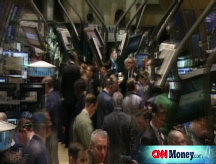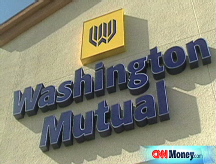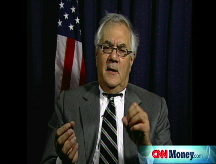Stocks pop on bailout bets
The Dow rallies and broader market erases most of its losses as investors expect some form of the $700 billion bank bailout plan will go through.

NEW YORK (CNNMoney.com) -- Stocks rallied at the end of a tough session on Wall Street, as investors boosted banks and other stocks on optimism that a compromise on the proposed $700 billion bank rescue plan will be announced shortly.
Also helping spark the late-session advance: a New York Times report that Citigroup is in early talks to buy Wachovia. Spokespeople for both companies declined to comment. After the close of trade the Wall Street Journal reported that Wachovia is also talking with Spain's Banco Santander and Wells Fargo.
Credit markets remained nearly frozen, but eased slightly from Thursday's levels. Oil prices fell and gold prices rose. The dollar was weaker versus other major currencies.
The Dow Jones industrial average (INDU) gained 120 points, or 1.1% on a late-session rally in its bank and consumer stocks. The Standard & Poor's 500 (SPX) index gained 0.4% and the Nasdaq composite (COMP) was barely changed.
Stocks tumbled through the afternoon on worries about the passage of the $700 billion bank bailout plan amid opposition from House Republicans. Also dragging on stocks: news that JPMorgan Chase bought Washington Mutual after it was seized by federal regulators in the biggest bank failure in U.S. history.
However, stock declines eased up as the day progressed and bailout talks were restarted. Late Friday afternoon, Sen. Barney Frank said an agreement on the bill will be in place by Sunday.
Joseph Saluzzi, co-head of equity trading at Themis Trading said investors were likely trying to put themselves in good position ahead of an expected rally Monday on a weekend bailout plan announcement.
"The market is expecting a deal, it's positioned for a deal, and if it doesn't get a deal or at least an announcement that a deal is very close, watch out come Monday morning," Saluzzi said.
He noted that Wall Street doesn't take disappointment well, as when a company's profit report is short of forecasts.
But assuming there is a deal announced this weekend, the stock reaction Monday will no doubt be euphoric, he said. But longer term, investors may take a less positive reaction to some aspects of the deal, depending on how it pans out.
Bank rescue plan: Stocks rallied Thursday after lawmakers said they had essentially agreed on terms of the $700 billion bank bailout plan following days of heated debate.
But talks broke down along party lines at a White House meeting later in the day, and a late-night meeting of Treasury Secretary Henry Paulson and members of Congress proved unsuccessful.
Talks resumed Friday. President Bush spoke briefly after the markets opened, acknowledging the gridlock, but also saying that Congress will move quickly on getting a plan together. A deal is expected over the weekend. (Full story)
The sooner something is established, the better, said Kenny Landgraf, principal and founder at Kenjol Capital Management.
"The quicker you get something done, the quicker the confidence is restored," Landgraf said. "And the market needs it."
President Bush, Paulson and Federal Reserve Chairman Ben Bernanke all have said that the struggling economy will be dealt an even bigger blow if a plan is not enacted.
The bank rescue plan would mark the biggest government intervention in the financial system since the Great Depression. It calls for the Treasury Department to buy, hold and eventually sell bad mortgage assets from banks in an effort to get them to lend again and loosen up the credit markets.
The plan also provides help to taxpayers, limits executive pay at participating firms and includes more government oversight. Democrats and House Republicans are reportedly at odds on how to fund the bailout, with some House Republicans arguing that Wall Street should fund the recovery through private capital. (Full story)
Washington Mutual: The savings and loan giant is the latest company to collapse amid the housing market and subprime mortgage crisis.
Federal regulators seized WaMu (WM, Fortune 500) Thursday night and sold its banking assets to JPMorgan Chase (JPM, Fortune 500) in a $1.9 billion deal. The deal also includes JPMorgan raising $10 billion in stock, $2 billion more than initially announced. (Full story)
Late Friday, S&P said WaMu was being removed from the S&P 500 after the close of trade Monday, to be replaced by Flowerserve (FLS), a maker of pumps and valves used by the oil and gas and utility industries.
The collapse was the biggest bank failure in history and marks the second storied Wall Street firm bought by JPMorgan this year, following Bear Stearns in March. The government also negotiated that deal.
(Will WaMu CEO walk away with millions?)
WaMu is the fifth major bank this month to collapse or become nationalized. For a look at how things got this bad, click here
Financials: Washington Mutual shares fell 91%, while JPMorgan rallied 11%.
Wachovia (WB, Fortune 500) ended 27% lower, despite the late-session merger talk. Both Wachovia and National City had slumped during the session on worries that they could be the next to collapse. Morgan Stanley (MS, Fortune 500) also declined.
But a slew of bank stocks rallied, including Dow components American Express (AXP, Fortune 500), Citigroup (C, Fortune 500) and Bank of America (BAC, Fortune 500).
Other big Dow gainers included Caterpillar (CAT, Fortune 500), Home Depot (HD, Fortune 500) and Microsoft (MSFT, Fortune 500).
A small California bank holding company called Capital Corp of the West (CCOW) jumped 262%, mostly in the last 20 minutes of trade, on rumors that it was about to be bought, traders said.
Earnings: Research in Motion (RIMM) shares plunged almost 27% in active Nasdaq trading after the Blackberry wireless maker reported weaker-than-expected fiscal second-quarter earnings and warned that third-quarter earnings won't meet estimates.
Economy: At the same time as the bank crisis, reports continue to show that economic growth is slowing. The government revised second-quarter GDP growth lower, to an increase of 2.8% from an initial reading of 3.3% a month ago. However, second-quarter growth was still better than the previous two quarters. (Full story)
Credit markets: Businesses depend on the credit markets to function on a daily basis, and the absence of ready capital has threatened to stall the broader financial system.
Markets remained tight Friday, with a key measure of bank jitters hitting an all-time high. The Libor-OIS spread, one gauge that banks use to determine lending rates, rose to a record 2.08%.
However, other indicators showed a slight improvement.
The three-month Treasury bill, seen as the safest place to park money in the short term, rose to 0.86% from 0.75% late Thursday. Last week, the three-month bill fell to a 68-year low around 0% as panic gripped financial markets.
The TED spread, a measure of financial market jitters, dipped to 2.91% after touching a more than 22-year high on Thursday of 3.37%. The TED spread is the difference between what banks charge each other to borrow for three months and what the the Treasury pays. If banks are charging each other a bigger premium than the U.S. government, that's a sign of fear.
Long-term Treasury prices rose Friday, lowering the yield on the benchmark 10-year note to 3.82% from 3.85% late Thursday. Treasury prices and yields move in opposite directions.
Treasury prices have been rallying recently and yields tumbling as nervous stock market investors have looked for safer areas to move their cash.
(For a look at how tighter credit conditions have been impacting individuals, click here.)
In an attempt to keep liquidity flowing, the Federal Reserve Friday expanded its deal with the European Central Bank and the Swiss National Bank to make an additional $13 billion in funds available to banks overseas. (Full story).
And some economists think that the central bank could announce an emergency interest-rate cut sometime in the next few days. (Full story)
Oil and gold: U.S. light crude oil for November delivery settled down $1.13 at $106.89 a barrel on on the New York Mercantile Exchange.
Oil prices had plummeted over $55 after peaking at $147.27 a barrel on July 11, as investors bet that sluggish global growth will diminish oil demand. But prices have soared in the last few weeks as the financial crisis has intensified and investors sought to put their money into hard assets.
COMEX gold for December delivery rose $6.50 to settle at $888.50 an ounce. Like oil, gold prices had also rallied during the biggest periods of unrest over the last few weeks
Other markets: In currency trading, the dollar fell against the euro and the yen.
Gas prices fell for the eighth day in a row, according to a nationwide survey of credit card activity.
In global trade, European and Asian markets both ended lower. ![]()







